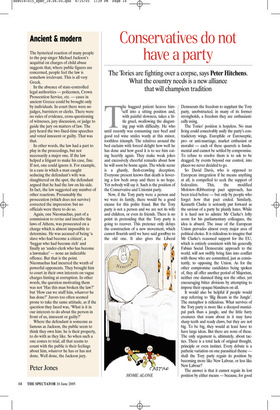Ancient & modern
The hysterical reaction of many people to the pop singer Michael Jackson’s acquittal on charges of child abuse suggests that, where public figures are concerned, people feel the law is somehow irrelevant. This is all very Greek.
In the absence of state-controlled legal authorities — policemen, Crown Prosecution Service, etc. — cases in ancient Greece could be brought only by individuals. In court there were no judges, barristers or clerks. There were no rules of evidence, cross-questioning of witnesses, jury discussion, or judge to guide the jury on matters of law. The jury heard the two fixed-time speeches and voted innocent or guilty. That was that.
In other words, the law had a part to play in the proceedings, but not necessarily a major one. If the law helped a litigant to make his case, fine. If not, one could ignore it. For example, in a case in which a man caught seducing the defendant’s wife was slaughtered on the spot, the defendant argued that he had the law on his side. In fact, the law suggested any number of other reactions. Presumably the prosecution (which does not survive) corrected the impression: but no officials were there to do so.
Again, one Nicomachus, part of a commission to revise and inscribe the laws of Athens, was prosecuted on a charge which is almost impossible to determine. He was accused of being ‘a slave who had become a citizen’, a ‘beggar who had become rich’ and finally an ‘under-clerk who has become a lawmaker’ — none an indictable offence. But that is the point. Nicomachus had incurred the wrath of powerful opponents. They brought him to court in their own interests on vague charges hinting at corruption. In other words, the question motivating them was not ‘Has this man broken the law?’ but ‘How can we stuff him, whatever he has done?’ Jurors too often seemed prone to take the same attitude, as if the question they faced was, ‘What is it in our interests to do about the person in front of us, innocent or guilty?’ Where the defendant is someone as famous as Jackson, the public seem to think they own him: he is their property, to do with as they like. So when such a one comes to trial, all that seems to count with the public is their feelings about him, whatever he has or has not done. Well done, the Jackson jury.
















































 Previous page
Previous page